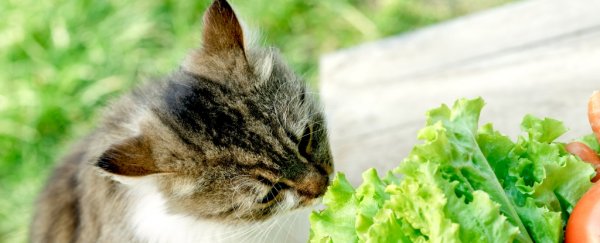Cats and dogs may be carnivores, but that hasn't stopped a surprising number of pet owners from wistfully wishing they could switch their furry friends to a plant-based diet - or even already doing so.
Of 3,673 cat- and dog-owning humans surveyed around the world, a whopping 35 percent expressed interest in turning their meat-eating pets vegan.
The aim of the study was to look into meat avoidance in pet owners, and how it affects the food they feed their companion animals. And, indeed, wanting to feed pets a vegan diet was more prevalent in, but not exclusive to, vegan humans.
Vegans accounted for 212 (5.8 percent) of the respondents, 78 percent of whom indicated that they would feed their pet a plant-based diet. In fact, 58 vegans, or 27 percent, were already doing so. One vegetarian was also feeding their pet a vegan diet.
"That percentage, 27 per cent, might sound like a small number," said veterinarian Sarah Dodd of the University of Guelph in Canada, "but when you think of the actual numbers of pets involved, that's huge, and much higher than we expected."
Dogs are what is known as facultative carnivores, which means they can technically survive on a plant-based diet if need be. However, the creation of such a diet needs to be approached carefully to make sure it is giving the dog everything it needs to stay healthy - and, of course, dogs love to chew hide and bones, which helps their teeth and mental health.
Cats, on the other hand, are obligate carnivores. This means that, while they can eat plants, cats cannot be healthy without a meat-based diet. It is not, currently, a good idea to try to feed your cat a vegan diet. In fact, in the UK, doing so could net you criminal charges under the Animal Welfare Act, which requires pet owners make sure all their pets' needs are being met.
Nevertheless, 11 cat owners in the study were doing so, along with 48 dog owners.
There's good news, though. Although a high number of respondents expressed interest in a vegan pet diet, most of them would also not do so unless there was vegan pet food available that could adequately meet the pets' nutritional needs.
In fact, over half the omnivores and vegetarians surveyed said they thought it would be immoral to feed cats and dogs a plant-based diet.
Those who were interested in vegan pet diets cited concern for the welfare of farm animals as the most prominent concern about feeding their animals meat - which absolutely makes sense.
"People who avoid eating animals tend to share their homes with animal companions," the research team, who disclose some funding by pet food industry, including plant-based pet foods, notes in the paper.
Amid reports that eating less meat is good for the environment (although that's controversial), your mental health and good for your physical health, veganism is on a global rise. This could mean that interest in vegan pet food will rise too.
"While only a small proportion of pet owners are currently feeding plant-based diets to their pets, it is safe to say that interest in the diets is likely to grow," says Dodd.
The findings, the researchers noted, indicates that further research is needed into plant-based nutrition for cats and dogs living with humans - whether such a diet can work, and what the potential health risks are.
Until this is figured out, please don't try to make your cat live on kale smoothies. And if you're going to try for a vegan dog diet, don't do so without extensive consultation with your vet.
The research has been published in PLOS One.
